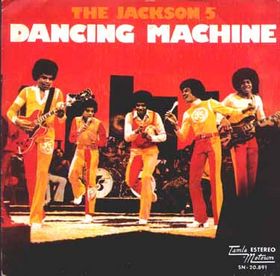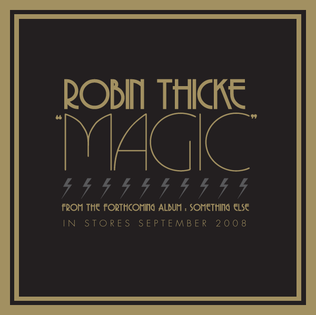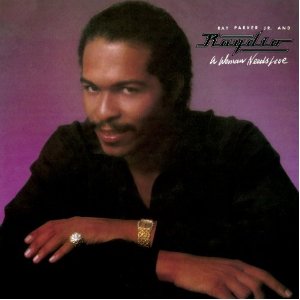Related Research Articles

Floetry were an English R&B duo comprising Marsha Ambrosius and Natalie Stewart. The group recorded two studio albums, one live album, and sold over 1,500,000 records worldwide. Formed in 1997, Floetry started on the performance poetry stage. They have worked with many US musicians and artists including: Jill Scott, Queen Latifah, Michael Jackson, Common, The Roots, Bilal, and more founders of Neo-Soul.

"Dancing Machine" is a song recorded by American R&B group the Jackson 5, and was the title track of their ninth studio album. The song was originally recorded for the group's 1973 album G.I.T.: Get It Together and was released as a remix for a response to the success of the single.
"Hearts of Stone" is an American R&B song. It was written by Eddie Ray and Rudy Jackson, members of the San Bernardino, California-based rhythm and blues vocal group the Jewels which first recorded it for the R&B label in 1954. The Jewels began as a gospel group, then became the Marbles, recording for the Lucky label out of Los Angeles. According to Johnny Torrence, leader of the Marbles/Jewels, it was taken from a song they recorded in their gospel days.
Paul & Paula are a former American pop singing duo, best known for their 1963 million-selling, number-one hit record, "Hey Paula".

"I Can't Stop Loving You" is a popular song written and composed by country singer, songwriter, and musician Don Gibson, who first recorded it on December 3, 1957, for RCA Victor Records. It was released in 1958 as the B-side of "Oh, Lonesome Me", becoming a double-sided country hit single. At the time of Gibson's death in 2003, the song had been recorded by more than 700 artists, most notably by Ray Charles, whose recording reached No. 1 on the Billboard chart.

"Opposites Attract" is a song by American singer Paula Abdul from her debut album, Forever Your Girl (1988). It was written and produced by Oliver Leiber. Vocals on the song, in addition to Abdul, were provided by Bruce DeShazer and Marv Gunn, also known as The Wild Pair. "Opposites Attract" was the sixth and final single from the album in November 1989 and achieved success in many countries, including the United States, Canada, and Australia, where it was a number-one hit. Lyrically, the song is about a couple who love each other despite being different in almost every way possible.

"Didn't I (Blow Your Mind This Time)" is a song co-written by record producer Thom Bell and William Hart, lead singer of the American R&B/Soul vocal group the Delfonics. It was released by the group in 1969 on the Philly Groove record label and is regarded as a classic, winning a Grammy Award for Best R&B Vocal Performance by a Duo or Group.

"(If Loving You Is Wrong) I Don't Want to Be Right" is a song written by Stax Records songwriters Homer Banks, Carl Hampton, and Raymond Jackson. Originally written for The Emotions, it has been performed by many singers, most notably by Luther Ingram, whose original recording topped the R&B chart for four weeks and rose to number 3 on the Billboard Hot 100 in 1972. Billboard ranked it as the No. 16 song for 1972.
"Hey Paula" is an American pop standard love song recorded by the singing duo Paul & Paula. It hit number one on the Billboard Hot 100 on the week ending February 9, 1963, and also made it to number one on the Hot R&B Singles chart. "Paul" was the song's writer, Ray Hildebrand, a student at Texas' Howard Payne University, a Baptist institution in the city of Brownwood. "Paula" was Jill Jackson, the niece of the owner of the boarding house where Ray lived.
"I'm Beginning to See the Light" is a popular song and jazz standard, with music written by Duke Ellington, Johnny Hodges, and Harry James and lyrics by Don George and published in 1944.
"With a Child's Heart" is a song by the singer Stevie Wonder, from his album Up-Tight. The song was released as the b-side to the single "Nothing's Too Good for My Baby".
"Together Again" is a 1964 song by United States country singer and guitarist Buck Owens.

"I'll Be Good to You" is a 1976 hit song by R&B duo the Brothers Johnson. George Johnson, one of the two Johnson brothers in the band, wrote the song after deciding to commit to a relationship with one woman, instead of dating several at a time. While George was recording a demo for the song, family friend Senora Sam came by and added some lyrics. Brothers Johnson producer and mentor Quincy Jones heard the song, liked it, and convinced George to sing lead on the finished track. Released from their debut album, Look Out for #1, it was a top-ten hit on the Billboard Hot Singles Charts, peaking at number three, and a number one song on the Billboard R&B Charts during the summer of 1976. The single was later certified gold by the RIAA.
"Two Lovers" is a single released in 1962 by Mary Wells on the Motown record label. The song was the third consecutive hit to be both written and produced by Smokey Robinson of The Miracles and recorded by Mary Wells, the two previous charters being "The One Who Really Loves You" and "You Beat Me to the Punch." The song's cleverly devised lyrics at first appear to be about a girl singing to one lover who is "sweet and kind" and a second who treats her bad and makes her sad; eventually, the girl reveals that the two lovers are actually the same person. The song became Wells's most successful release to date, reaching #1 on the Billboard R&B chart and #7 on the Billboard pop chart. Its success would be eclipsed two years later by the singer's most successful release, "My Guy."

"She's Not You" is a 1962 song recorded by Elvis Presley and released as a single on RCA Victor.

"Lovers and Friends" is a song by American rap group Lil Jon & the East Side Boyz featuring American singer Usher and American rapper Ludacris, from the group's fifth and final studio album, Crunk Juice (2004). The song was written by the artists alongside Michael Sterling, while produced by Lil Jon. It was released by BME and TVT Records in 2004, as the third single from the album. An R&B slow jam, the song consists of a piano melody and hook, and contains a sample of Sterling's song of the same name. The lyrics depict the three artists attempting to seduce women.

"Magic" is a song by American R&B singer Robin Thicke. The song was produced in 2008 for Thicke's third studio album, Something Else. Its live instrumentation varied; including conga, horn and violin. The song's lyrics refer to a someone reversing their lovers past hurts in relationships, and uses magic metaphors. The song was written by him along with his ex-wife Paula Patton and James Gass. The track was sent to radio on May 20, 2008 and is the album's lead single.

"A Woman Needs Love (Just Like You Do)" is a 1981 song recorded by American R&B vocalist and songwriter Ray Parker Jr., along with his group, Raydio. It led their 1981 album, A Woman Needs Love, the last Parker recorded with Raydio.
"What Kind of Fool (Do You Think I Am)" is a 1964 single written by Ray Whitley and recorded by the Tams.

A Woman Needs Love is a 1981 album by American band Raydio, led by guitarist singer/songwriter Ray Parker Jr. Released by Arista Records on April 11, 1981, this is the fourth and final album by the band.
References
- ↑ "Original versions of Young Lovers written by Jill Jackson [US1], Ray Hildebrand | SecondHandSongs".
- ↑ Allmusic chart history
- ↑ Whitburn, Joel (2004). Top R&B/Hip-Hop Singles: 1942-2004. Record Research. p. 453.